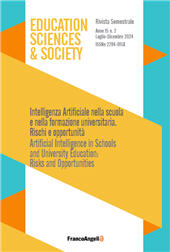Inclusive education in the age of AI : a critical perspective on policy guidelines through the lens of ecological-systemic theory of technological mediation
329-341 p.
Given the recent advancements in generative artificial intelligence, this paper examines the implications of generative artificial intelligence (AI) for educational systems, focusing on inclusion as a critical lens for understanding current political and theoretical trajectories in AI implementation in education. After providing an overview of the main soft policy documents developed by UNESCO in relation to AI and inclusion, the paper will highlight how the theoretical framework that emerges from these documents risks collapsing the theme of inclusion with that of integration and techno-solutionist views, which are inadequate both for understanding the socio-technical transformations driven by these technologies and for addressing the issue of inclusion.
Subsequently, this paper employs the philosophical theory of technological mediation and a socio-technical analysis to examine the relationship between generative AI and human development, aiming to elucidate the connections among inclusion, social justice, and artificial intelligence. [Publisher's Text].
Fa parte di
Education Sciences & Society : 2,2024-
Articoli dello stesso fascicolo (disponibili singolarmente)
-
Informazioni
Codice DOI: 10.3280/ess2-2024oa18453
ISSN: 2038-9442
PAROLE CHIAVE
- Inclusion, Artificial Intelligence, Ecological-Systemic Theory, Sociotechnical Theory, Post-phenomenology


